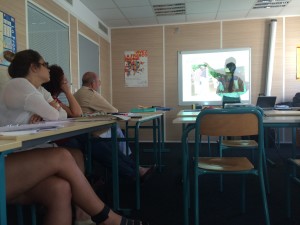 |
| Pictured left to right: Brazil, Spain, United States, France -- diversity is everywhere. |
This isn't just any old French classroom. This is Intensive French Language taught in France by the French in French. This in international school 101, communications studies 3000, and Honors how-to-make-friends.
I, like many before me, I hope, was mortified to learn that not a single word of English would be spoken. Even in my American classrooms where we spoke all in French, if we didn't know a word we could ask for the English translation or have a French concept explained in English so we’d better understand it.
NOT HERE.
Here, you spent four hours a day having grammar and comprehension shoved at you with full force only to return an hour after class ends for another two hours of phonetiques or cinema or media. It's a lot. The first day nearly everyone walked out with the same expression of bewildered horror on their faces. And not to say that sitting in a bland classroom in France during the summer is fun per say, it's worth it.
When I learned something new, my host mom would look back at me, pleased, and exclaim, “Bon, Faith!” whenever I used the conditional or futur proche/simple tenses correctly, or threw in a new vocabulary word. She'd laugh; I'd laugh; it's great.
But it's not just with the French that the language is useful for.
On the last day of class, the Japanese woman in my class held the door open for me as I rushed to catch up with it. “Merci!” “De rien!” And then, with class having ended for the day, my mind almost immediately switched back to English and continued to speak to her as such. Until I realized, looking at this woman as I did so, that the only language we had in common was the one we'd been studying abroad together for the past month: French.
How cool?! How freaking cool.
For those who are skeptical about learning a language or going to another country, staying with a host family, or anything in between, stop worrying. That one 10 minute broken-French conversation, where we were smiling like idiots because we were both trying so hard to understand the ascents and not sound like third graders, is why it's all going to be okay.
 |
| For the first time in school history, I used an entire notebook filled with notes. |
I couldn't have had that conversation without having studied French all these years. I wouldn’t have learned about how excited she is to return to Tokyo to see her husband or how much she’s going to miss Aix and certainly not how she thinks of American culture compared to her own. It was just one conversation, it was just ten minutes and maybe I’m making too big a deal out of this but to me, it encompasses the entire reason why learning another language is important: to connect.
Faith Schweikert is a Summer 2015 CEA MOJO in Aix-en-Provence, France. She is currently a second year at the University of Virginia.










